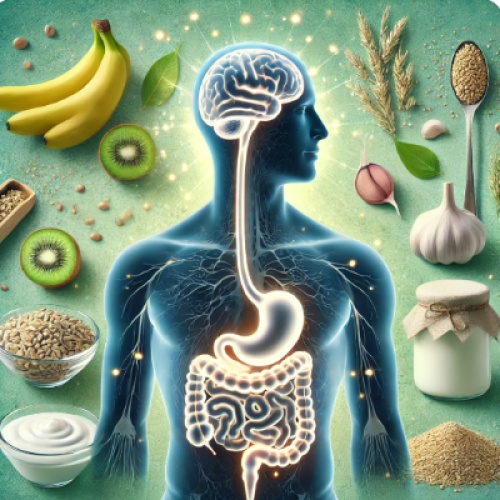The Gut-Brain Axis: More Than Just Digestion
The gut, often called the "second brain," is lined with over 100 million neurons and is deeply intertwined with the brain through the vagus nerve and various chemical pathways. This connection allows constant communication between the gut and the brain, affecting mood, cognition, and even behaviour. What we consume not only fuels our bodies but also influences how we think and feel.
An imbalanced gut, often marked by poor digestion, inflammation, and imbalanced gut bacteria, has been linked to a range of conditions, from digestive issues like irritable bowel syndrome (IBS) to mental health problems such as anxiety and depression. This growing awareness has fueled interest in how gut health can be nurtured to promote overall wellness.
Probiotics: Building a Healthy Gut Microbiome
Probiotics, often referred to as "good bacteria," are living microorganisms that help balance the gut microbiome. A healthy microbiome is essential for digestion, immune function, and mood regulation. Consuming probiotics through supplements or fermented foods like yoghurt, sauerkraut, and kimchi helps replenish and maintain a diverse community of beneficial bacteria.
These beneficial microbes not only aid in breaking down food but also produce neurotransmitters such as serotonin, which plays a critical role in regulating mood. 90% of the body's serotonin is produced in the gut. By fostering a healthy microbiome, probiotics help promote both physical and mental wellness.
Prebiotics: Feeding the Good Bacteria
Prebiotics are the non-digestible fibres found in foods such as garlic, onions, bananas, and whole grains. These fibres act as food for probiotics, encouraging the growth of beneficial bacteria in the gut. A diet rich in prebiotics creates a favourable environment for these good bacteria to thrive, supporting a balanced microbiome.
While probiotics introduce beneficial bacteria into the gut, prebiotics ensure that these bacteria can survive and function effectively. Together, probiotics and prebiotics work in harmony to support digestive health, enhance immunity, and promote a positive mood.
Balanced Diet: The Foundation of Gut Health
While probiotics and prebiotics are crucial for gut health, they are only part of the equation. A balanced diet rich in fibre, healthy fats, lean proteins, and a variety of fruits and vegetables is fundamental to maintaining a healthy gut. Fiber, in particular, is essential as it helps regulate digestion, prevents constipation, and feeds the beneficial bacteria in the gut.
Diets high in processed foods, sugar, and unhealthy fats can disrupt the gut microbiome, leading to inflammation and an overgrowth of harmful bacteria. By focusing on whole, nutrient-dense foods, individuals can support a diverse and healthy microbiome, reducing the risk of chronic diseases and improving mental health.
The Impact of Gut Health on Overall Wellness
The link between the gut and brain suggests that taking care of your gut can have far-reaching benefits beyond digestion. A healthy gut contributes to a stronger immune system, improved sleep, better stress management, and enhanced mental clarity. Research is even exploring the potential role of gut health in preventing neurodegenerative diseases such as Alzheimer's and Parkinson's.
As more people recognize the significance of gut health in overall wellness, probiotics, prebiotics, and balanced diets are becoming essential components of a holistic approach to health. The gut-brain connection underscores the importance of nurturing your body from the inside out.
Conclusion
Gut health is no longer a niche concern but a key element of overall wellness. By focusing on a balanced diet, incorporating probiotics and prebiotics, and maintaining a healthy lifestyle, individuals can support their gut health, which in turn promotes mental clarity, emotional stability, and physical vitality. The growing focus on the gut-brain connection is revolutionizing how we think about nutrition and wellness, offering a path to a healthier, happier life.
As the science behind the gut-brain axis continues to unfold, one thing is clear: taking care of your gut means taking care of your mind and body.





